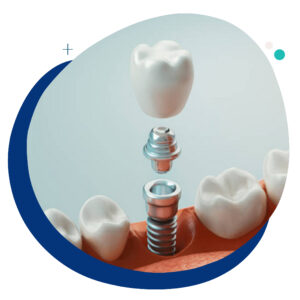Dental Implants
Dental Implants Services are artificial tooth roots that provide a stable foundation for fixed or removable replacement teeth. To replicate the root of a normal tooth, they are surgically implanted into the jawbone and created of biocompatible materials such as titanium. A dental crown, bridge, or denture can be fixed to an implant once it has fused with the jawbone and the surrounding tissues, offering a durable and solid replacement for missing or damaged teeth.

Compared to conventional denture and bridge options, dental implants have several benefits, including:
- Aesthetics:
Dental implants provide people with a smile that looks natural since they look and feel just like real teeth.
- Comfort:
Dental implants do not slip or irritate the gums, they are more pleasant than dentures and bridges.
- Functionality:
Patients with dental implants can eat and converse like they would if they had their natural teeth, which enhances their quality of life.
- Durability:
Dental implants are a long-term replacement for missing teeth because, with proper care, they can last a lifetime.
- Better oral health:
Unlike traditional bridge solutions, dental implants do not call for the extraction of good teeth. This promotes better dental health in general and preserves the natural teeth that are still present.
How Long Do Dental Implants Last?
Dental implants have become a preferred choice because of their reputation for strength and endurance in replacing missing teeth. Avalon Family Dentistry uses the highest quality materials for their dental implants and with proper maintenance, they can last a lifetime.
Research has proven that implants have a 95% success rate over 5 years and this rate stays high for many years after that. The durability is dependent upon good oral hygiene. They require much attention just like natural teeth, meaning they need to be brushed and flossed regularly to avoid plaque buildup.
Patients must also refrain from habits that could harm the implant, such as teeth clenching or grinding, biting on hard objects, and smoking. These actions may put the implant under too much strain, which could result in an early failure.
Is it Painful to Get Dental Implants?
The process is not considered painful, and patients experience only minor discomfort both during and after the procedure. Local anesthesia may be used during the implant placement to numb the area and lessen pain. Your dentist may recommend prescription painkillers based on your situation. There is a possibility you might experience some minor swelling, tenderness, or discomfort but these side effects usually go away within a few days.
Patients may occasionally feel temporary sensitivity as the implant bonds to the jawbone. Within a few days, you can resume your regular routines, and any postoperative discomfort can be treated with over-the-counter painkillers. Communicate with your dentist with any concerns or queries, this will help them to assess the level of uneasiness you might experience and recommend pain management techniques.
Can Dental Implants Be Placed On Top or Bottom Jaw?
Both the upper and lower jaws can receive implants. The location and number of missing teeth are factors that determine the implant’s placement. The quantity and quality of the jawbone and oral health will also decide whether the patient is eligible for the procedure. In cases where the jawbone is insufficient for implant placement, a bone graft may be necessary.
Dental implants can be used in the upper jaw to support a denture or replace one or more missing teeth. Dental implants are frequently used in the lower jaw to restore missing teeth as well as to add stability and support to a full arch or full mouth restoration.
The Process
The steps involved in getting dental implants are described below:
- Consultation:
The dentist will conduct a thorough evaluation of whether implants are the right option for you. Your medical history and existing dental condition would be assessed to make an informed judgment.
- Treatment Planning:
A customized plan for the procedure will be developed after assessing the results from the evaluation. The plan would include details regarding the implant and also the time duration that is expected for the process to be completed.
- Preparation:
In the event there is insufficient jawbone, a bone graft would be necessary to build up the quality and quantity of the jawbone. The bone graft will ensure long-term stability and success of the implant.
- Implant Placement:
After being given anesthesia, a titanium post will be inserted in the jawbone and left to fuse. The healing process can take several months and varies from patient to patient.
- Abutment Placement:
After the implant has fully integrated with the jawbone, the abutment is placed on top of the implant. The abutment serves as a connection between the implant and the final restoration.
- Restoration Placement:
Once the abutment is in place, the final restoration (dental crown, bridge, or denture) is attached to the abutment. The restoration is designed to look, feel, and function like natural teeth, providing the patient with a complete and functional smile.
- Aftercare:
The final step is to follow the recommended aftercare instructions provided by your dentist to maintain good oral hygiene and ensure the longevity of the dental implants. This may include regular dental check-ups, cleanings, and a home care routine.



